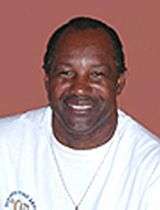Benny Barnes
 Benny Barnes, at Contra Costa College | |||||||||||
| No. 31 | |||||||||||
|---|---|---|---|---|---|---|---|---|---|---|---|
| Position: | Cornerback / Safety | ||||||||||
| Personal information | |||||||||||
| Born: |
March 3, 1951 Lufkin, Texas | ||||||||||
| Height: | 6 ft 1 in (1.85 m) | ||||||||||
| Weight: | 190 lb (86 kg) | ||||||||||
| Career information | |||||||||||
| High school: |
John F. Kennedy (Richmond, California) | ||||||||||
| College: | Stanford | ||||||||||
| Undrafted: | 1972 | ||||||||||
| Career history | |||||||||||
| * Offseason and/or practice squad member only | |||||||||||
| Career highlights and awards | |||||||||||
| |||||||||||
| Career NFL statistics | |||||||||||
| |||||||||||
| Player stats at PFR | |||||||||||
Benny Jewell Barnes (born March 3, 1951) is a former American Football cornerback in the National Football League for the Dallas Cowboys. He played college football at Stanford University.
Early years
After attending John F. Kennedy High School of Richmond, he moved on to Contra Costa College, where he was an All-conference linebacker for the football team and also an All-conference track and field athlete.
In 1970, he transferred to Stanford University, where he was converted from linebacker to free safety, becoming a two-year starter (24 consecutive starts) and a part of the “Thunder Chickens” defense, that was very effective (9 of their 11 starters ended up playing professional football).
In 1971, he posted 7 interceptions (three in a game against the University of Washington) and was an honorable-mention All-Pac-8 selection as a senior.[1]
He contributed to teams led by Jim Plunkett in 1971 and Don Bunce in 1972 to two of the biggest upset victories ever in the Rose Bowl.
Although he played just two years, he was inducted into the Stanford Athletic Hall of Fame and selected to the Stanford's All-Century Team. In 2011, he was inducted into the California Community College Athletic Association Hall of Fame.
Professional career
Dallas Cowboys
In 1972, he was signed as an undrafted free agent by the Super Bowl champion Dallas Cowboys, and made the team based on his excellent special teams play on punt and kickoff coverage.
In 1974, he was named the special teams captain and by the end of the season he was a starter at left cornerback, but fractured his right ankle and foot against the Cleveland Browns, an injury that would affect him the rest of his career (three surgeries). The next year, he was used on passing downs as the fifth or sixth defensive back and started 3 games.
In 1976, he regained the starter position at left cornerback in the fifth game after Mark Washington suffered 2 concussions at the beginning of the season.
Although he didn't have great athletic ability, he compensated with technique, instincts and effort, which made him and underrated part of the team. In 1977, he was the starter for the Super Bowl XII winning team.
His best season came in 1978, although he missed 3 games with ankle and foot problems, he led the team with 5 interceptions, while still excelling on special teams. In Super Bowl XIII he was involved in one of the most controversial calls in Super Bowl history, when Lynn Swann ran up his back and both fell, resulting in a pass interference that gave the Pittsburgh Steelers the ball deep in Cowboys territory and an eventual crucial touchdown. NFL Commissioner Pete Rozelle, would later concede that it was the official call was wrong.[2]
In 1979, despite a sore right foot that affected him since 1975, he tied for the team lead in interceptions and fumble recoveries (including one returned for a 33-yard touchdown). In the offseason he underwent a joint fusion surgery on his chronically right sore foot.
In 1980, he missed the first 5 games after having an appendectomy in the morning of the season opener. The Cowboys struggled with Barnes (6 games) and Steve Wilson (10 games) sharing the left cornerback position.
The next season he was moved to strong safety, to improve the depth after the retirement of Charlie Waters and to make room for undrafted free agent Everson Walls. He played as a third-down specialist and had a 72-yard fumble return for a touchdown against the San Francisco 49ers.
Barnes was waived in 1983 at the end of training camp, and replaced with undrafted free agent Bill Bates.[3]
Oakland Invaders (USFL)
On January 14, 1984, he signed with the Oakland Invaders of the USFL, reuniting with John Ralston his former Stanford University coach.[4] He was released before the season started.[5]
Barnes retired after an 11-year career, where he was part of 8 NFC Championship Games and 3 Super Bowls. He is considered to be one of the best special teams players in Dallas Cowboys history.
Personal life
Barnes spent some time investing in restaurants and worked at Contra Costa College as equipment manager.[6] He is currently married, with three sons and one daughter.
References
- ↑ "Bobby Moore Again Named To All-Pac-8". Santa Cruz Sentinel. November 28, 1971. p. 18.
- ↑ "Super Bowl Call on Barnes was Wrong, Rozelle Says". Retrieved February 19, 2017.
- ↑ "Barnes Cut by Cowboys". Retrieved February 19, 2017.
- ↑ "Benny Barnes signs with Oakland Invaders". Retrieved February 19, 2017.
- ↑ "USFL teams trim rosters; Wranglers sign No.1 choice". Retrieved February 19, 2017.
- ↑ "For former football pro, it's all about the students". Retrieved February 19, 2017.